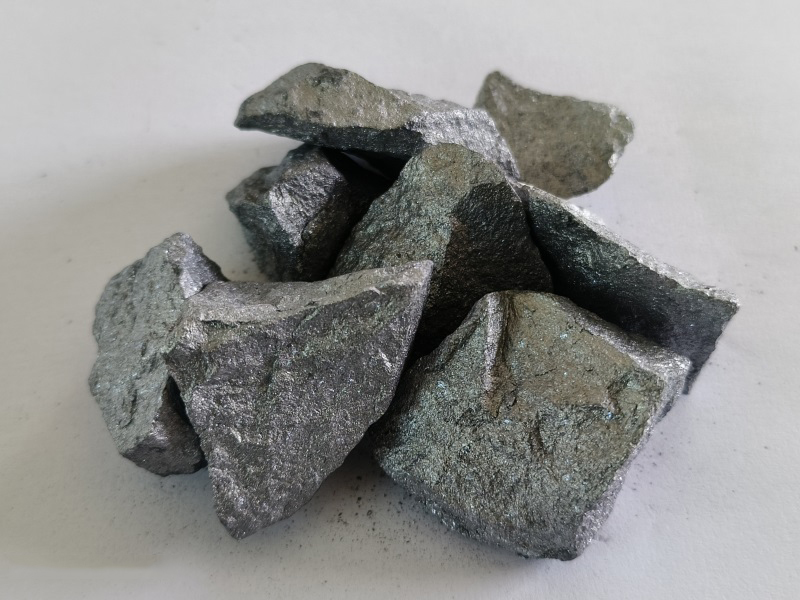Discuss the dosage and usage of ferrosilicon
Silicon Ferroalloy, commonly referred to as "Silicon Iron" or "Silicon Ferrite," is an important alloy primarily composed of iron and silicon. It is available in various forms, including blocks, granules, and powder, with the silicon content typically exceeding 70%. The choice of silicon iron depends on the specific requirements of the steelmaking process, and it is essential to use it correctly to ensure the quality of the steel produced.

Introduction to Silicon Iron Granules
Silicon iron granules are a form of silicon iron that has been processed into small, uniform particles. These granules offer several advantages over blocks and powder forms, such as ease of handling, uniformity in size, and improved reaction kinetics in the steelmaking process.
Main Uses of Silicon Iron Granules
Adjustment of Silicon Content: Silicon iron is used to adjust the silicon content in steel, which is crucial for enhancing the steel's mechanical properties, such as tensile strength and hardness.
Deoxidation: As a deoxidizing agent, silicon iron reacts with oxygen in the molten steel to form silicon dioxide, thereby reducing the oxygen content and improving the purity of the steel.
Inclusion Modification: The addition of silicon iron can help modify the type and distribution of inclusions in steel, leading to better steel cleanliness and improved mechanical properties.
Alloying Element: Silicon is an alloying element that, when added to steel, contributes to the formation of austenite, which is beneficial for processes like welding and heat treatment.
Electrical Steel Production: Silicon iron is extensively used in the production of electrical steels, where a controlled amount of silicon improves magnetic properties.
Foundry Industry: In the foundry industry, silicon iron is used to produce high-quality cast iron and ductile iron by controlling the carbon equivalent and improving the mechanical properties of the castings.
Usage of Silicon Iron in Steelmaking
The usage of silicon iron in steelmaking is determined by the specific requirements of the steel grade being produced. Here are some general guidelines:
Dosage: The dosage of silicon iron typically ranges from tens of kilograms to several hundred kilograms per ton of steel, depending on the desired silicon content and the deoxidation requirements.
Method of Addition: Silicon iron is usually added to the steel bath during the ladle treatment or the secondary metallurgy process. It can be added directly to the molten steel or through a ladle furnace.
Reaction with Oxygen: The reaction of silicon iron with oxygen in the steel is exothermic, which helps to maintain the temperature of the steel bath.
Controlled Addition: The addition of silicon iron must be carefully controlled to avoid excessive silicon content, which can lead to embrittlement of the steel.
Adjustment Based on Analysis: Regular analysis of the steel bath is necessary to determine the correct amount of silicon iron to be added, ensuring the desired chemical composition and mechanical properties of the steel.
Benefits of Using Silicon Iron Granules
Improved Reaction Efficiency: The granular form of silicon iron ensures a larger surface area for reaction with the steel, leading to faster and more efficient deoxidation and alloying.
Reduced Inclusion Formation: The controlled reaction of silicon iron granules helps to reduce the formation of harmful inclusions in the steel.
Enhanced Steel Properties: The use of silicon iron granules contributes to the production of steel with improved mechanical properties, such as higher strength and better ductility.
Consistency in Quality: The uniform size and composition of silicon iron granules ensure consistent performance in the steelmaking process.
Conclusion
Silicon iron, particularly in the form of granules, plays a vital role in the steelmaking industry. Its correct usage is paramount for achieving the desired quality of steel. Steelmakers must consider the specific requirements of their process and the steel grade being produced to determine the appropriate dosage and method of addition of silicon iron. By doing so, they can leverage the benefits of silicon iron granules to produce high-quality steel with enhanced mechanical properties and purity.
This article provides an overview of silicon iron granules, their main uses, and the considerations for their application in steelmaking. It emphasizes the importance of correct usage to ensure the quality of the final steel product. For a complete article of over 1200 words, further details on the chemical reactions, case studies, and the economic impact of using silicon iron granules in steelmaking could be included.






